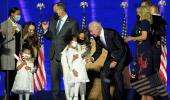He has Biden's ear and because of the past relationship, Biden will actually listen to him, unlike some past residents of Roosevelt House, notes Aditi Phadnis.

Los Angeles Mayor Eric Garcetti, selected by US President Joe Biden to serve as ambassador to India, ticks all the right boxes.
He is highly educated (Columbia University, a Rhodes Scholar at Oxford and the London School of Economics); is strongly pro-immigrant as a grandson and great grandson of immigrants; and has deep and enduring relationships with some of the pillars of the Indian community in Silicon Valley.
In picking Garcetti, Biden is rewarding a loyalist who was one of his national campaign co-chairs. He has Biden's ear and because of the past relationship, Biden will actually listen to him, unlike some past residents of Roosevelt House (the US ambassador's residence in New Delhi) and the previous president of the United States of America.
Garcetti was a rival of Kamala Harris for the vice-presidency until he pulled out of the race and instead opted to serve on the committee that vetted Biden's vice presidential contenders. At this point, this is only a factoid. But if Harris sets her sights on bigger things, he could be crucially influential for India.
He has also served in the US military (an intelligence officer in the United States navy reserve) for more than a decade and as such, will need no help in understanding strategic and military issues in the subcontinent. He was on the Pacific Fleet which covers India.
Interestingly, Garcetti's number 2 was named before him. Atul Keshup, also 50, the new charge d'affaires, is a familiar face in the subcontinent. Not only was Keshup posted in the US embassy in New Delhi, he was also deputy assistant secretary of state for South Asia, and US ambassador in Sri Lanka and Maldives.
A BJP supporter might describe the duo as Ram-Lakshman ki jodi.
India-US relations have a lot going for them. For the nth time, both countries have underlined the importance of their strategic partnership. The post-pandemic economic recovery process will force inter-dependence. But the challenges to the partnership are many. And they stem from geopolitics as well as from divergence on multilateral issues.
Most US troops have already left Afghanistan. The rest will leave by August 30. How the transition is managed has a bearing on politics in Pakistan, in Kashmir and on terror management in India.
The LAC is far from tranquil and could flare up any time. This is a new dimension of foreign policy in India that all countries, especially the US, will watch closely.
Much more nuanced are issues of domestic politics in India. Garcetti represents a party that has very strong and definite views on how minorities are treated in India. But there is another reality as well -- as the latest Pew survey on religion in India tells us: that while the minorities worry about the rise of Hindutva forces, they do not see themselves as victims of institutional discrimination.
Moreover, the rise of Hindutva sees pushback from the majority as well, the survey tells us.
It will fall on Garcetti and Keshup to tell folks back home to hold their horses before jumping to judgment about how India treats its minorities.
All of this will have an unintended impact. As foreign minister, Jaswant Singh steered India-US relations through many crises, and it helped that Bill Clinton and the Democrats understood for the first time, India's problems in the neighbourhood, suspending judgement on issues like human rights and minority rights.
Sushma Swaraj cruised on the back of charisma and charm. What both leaders had, in varying degrees, was the backing of the political base of the BJP.
But with S Jaishankar as foreign minister, it is all a bit different. Political elements in the establishment have begun muttering about his US visit (May 2021) being a 'disaster': He had to wait to meet secretary of state Anthony Blinken and was made to hear homilies about getting leaders back home to tone down Hindu nationalistic talk.
All this suggests a degree of plain speaking and a demand to see results by hardline elements in the BJP/RSS. If this becomes Jaishankar's driving compulsion -- taking positions to be politically acceptable in a party (and a business) to which he is new -- it would be skewing the reality of India.
Garcetti-Keshup will need to help him out on that score.
There are some issues on which India and the US will never see eye to eye. Climate change is one. Former environment minister Prakash Javadekar is on record as saying that the US contribution to the $100 billion fund for mitigation and adaptation announced in 2015 after the Paris Convention is yet to come. India has also said it will not pay any tax for export of its goods, as proposed by the European parliament.
Nothing will change overnight. But Eric Garcetti will have to take this into account when he takes charge.











